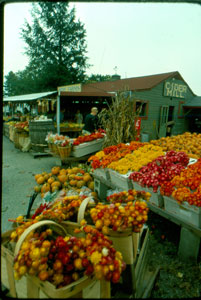8/28/2013
Lessons from a Farm Stand
Chris Beytes

Pleasant View Gardens of Loudon, New Hampshire, has long been a renowned provider of liner and finished plants for the Northeast market. Owned by Jeff and Henry Huntington, Pleasant View is one of the three Proven Winners partners, putting them at the pinnacle of the branded plant game. But how did they get there? It starts with a Connecticut farm stand and the retail lessons learned from their father.
Pictured: The Huntington's farm stand, circa 1973, just a few years before they moved to New Hampshire and purchased Pleasant View Gardens. Photo courtesy the Huntington family
Jonathan and Eleanor Huntington were the second-generation owners of the aforementioned farm stand, located on 15-acres in Westport, Connecticut (Eleanor’s family farmed 50 acres). Called Rippe Farms, it was stand was started by Eleanor’s father, Henry Rippe, and Henry’s brother, George. It was a typical retail farm stand, recalls Henry Huntington, with fruits, vegetables, bedding plants in the spring, pumpkins and cider in the fall, and Christmas trees and wreaths for the holidays.
But what wasn’t typical about Rippe Farm was Jonathan Huntington. Growing up in Connecticut, Jonathan worked for a time for a family grocery store called Mercurio’s. It was an innovative grocery for its time, catering to the wealthy folks of the region. It was there, Henry says, that his father learned the art of merchandising, value and pricing.
In 1968, upon the death of his father-in-law, Jonathan joined George in the business. And that’s when he began sharing with his young sons the merchandising and sales skills he’d learned at Mercurio’s and had honed at the farm stand.
“My father was all about big displays and the best and highest-quality merchandise that we could find,” recalls Henry. “[He would make] these huge displays, whether it was peaches or grapes or cherries or lettuce or whatever.”
“Kind of like a Whole Foods is now,” Jeff adds. “Great, fresh produce in big displays. Really creating an atmosphere of beauty and desire with this beautiful merchandise. It just got you hungry to buy.”
The farm stand was small, about the size of a two-car garage, but it would draw 2,000 customers on a summer weekend.
“We grew up in it,” says Henry. “Jeff worked the farm, and I loved the retail stand. I remember at 10 or 11 years old waiting on customers.” Westport was an affluent area. Paul Newman and Martha Stewart were regular customers.
“She used to drive my father crazy,” Jeff recalls of Ms. Stewart. “She would never be satisfied with the stuff that was out on the stand. She’d actually follow him right into our cooler.”
Dad’s lessons were simple. Says Jeff, “He always ask one of the kids working for him, ‘Would your mother buy that? Well, if your mother won’t buy it, we won’t sell it.’ He wasn’t afraid to throw things away.”
The transition from produce to bedding plants came around 1975, when the extended family, anxious to reap the benefits of the Connecticut real estate, pushed for the sale of the farm. Jonathan and Eleanor looked around the state for a new opportunity, but instead bought a piece of land in Concord, New Hampshire, near a favorite vacation spot.
It was on vacation in 1976 when they learned a small wholesale foliage nursery was up for sale. Under the guise of running an errand, Jonathan and Henry met with a realtor. When they got back to the vacation home, they told Eleanor, “We found our place.”
Jeff was home in Connecticut at the time. His father called and asked him to come up to see the nursery. “My first question was, ‘What’s mom say about it?’ He said, ‘She’s been crying about it all day,’” Jeff recalls with a laugh. Despite mom’s tears, they bought Pleasant View, and the family moved to New Hampshire. Jeff was 21, Henry was 17.
How did the lessons from the farm stand translate to the bedding plant and liner business?
“It’s the level of quality; it’s being innovative in how we sold our product,” Henry answers. And just being innovators, period. For instance, they were the first New England greenhouse with a seeder, which got them into the plug business.
“And not being afraid to try different things,” Jeff adds. Such as Kientzler New Guinea impatiens. “We were selling several million New Guinea impatiens right from the start. That got Kientlzer’s attention.” It was the reputation they’d build, plus their relationship with Kientzler, that put them in the right place at the right time when the Proven Winners opportunity came up.
But it was the lessons from a farm stand that made it all possible.
GT